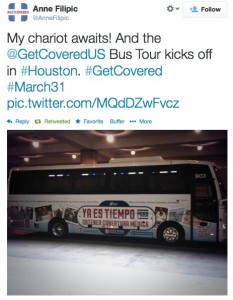
Edgar Walters, Texas Tribune
Texas enrollment in the online insurance marketplace created by the Affordable Care Act rose steadily in February but did not meet expectations set forth by the Obama administration, according to figures that the U.S. Department of Health and Human Services released Tuesday.
“As more Americans learn just how affordable marketplace insurance can be, more are signing up to get covered,” Health and Human Services Secretary Kathleen Sebelius said in a call announcing the enrollment data. “We expect that even more will sign up as we approach the March 31 deadline.”
The data is the last to be released by HHS before open enrollment closes on March 31, offering a glimpse at the daunting task facing advocacy groups as they make their final push to sign people up for health coverage.
Texas ranked third behind California and Florida in total enrollments since the launch of healthcare.gov on Oct. 1. As of March 1, 295,000 Texans had selected a coverage plan in the federal marketplace, up from 207,500 the month before.
The number represents a small fraction of the uninsured in Texas, the state with the highest percentage of people without health coverage nationwide. In 2012, more than 6 million Texans, about 24 percent of the population, lacked health insurance, according to U.S. census data.
“That is very low,” said Arlene Wohlgemuth, director of the Center for Health Care Policy at the conservative Texas Public Policy Foundation. “If the goal is to get uninsured people onto the exchange, they are such a long way from doing that.”
Sebelius noted that nationwide enrollment had reached more than 4.2 million. That number fell short of the Obama administration’s September prediction that total enrollment would reach 5.6 million by March.
Florida led in total enrollment among states that opted not to set up their own exchanges, with 442,000 people registered. Like Texas, Florida has a political climate that is largely unfavorable toward the Affordable Care Act and a high rate of the uninsured, at 21 percent. But Florida’s enrollment dwarfed the Lone Star State’s, a trend administration officials declined to comment on.
“We are doing extensive outreach and education efforts in both of those states,” said Julie Bataille, a spokeswoman for the federal Centers for Medicare and Medicaid Services. “That includes a range of activities on the ground and in enrollment destinations.”
Texans considered young adults — those between the ages of 18 and 34 — account for 27 percent of those who have signed up for coverage. Texans between 55 and 64 made up the largest demographic group of enrollees, at 26 percent.
HHS officials had predicted the number of young adults signing up for coverage would rise as the enrollment period wound to a close, but the data did not yet reflect such a trend. Opponents of President Obama’s signature health law have said that if young, healthy Americans are underrepresented in enrollment, that could negatively affect the quality of the insurance risk pool and potentially raise premiums.
“We have been concerned from the very beginning that the young people would not sign up, and 27 percent does seem low,” Wohlgemuth said.
Obama administration officials shrugged off the criticism. “We are encouraged by the percentage of young adults” enrolling in the exchange, said Bataille. “We think that will continue to increase.”
Women of all ages constituted a majority of Texas enrollments: 57 percent. That was consistent with the nationwide trend, which HHS officials said was anticipated. Maternity care, newborn care and contraception are among the 10 categories of benefits that all health insurance plans must cover under the ACA.
“Under the Affordable Care Act, being a woman is no longer considered a pre-existing condition,” Sebelius said.
Eighty-two percent of Texans who purchased health plans in the exchange through March have received financial assistance, according to the HHS data. That number rose sharply from the month before, when 73 percent of purchasers were eligible for federal subsidies. Texas’ Republican leadership did not expand Medicaid to cover poor adults, calling it an inefficient program. As such, Texans living below the poverty line do not qualify for subsidized health insurance.
The ACA requires most Texans to carry health insurance by March 31. That looming deadline has prompted health reform groups to redouble their efforts in getting Texans to enroll.
“We’ve found that there is a lot of misinformation and lack of information out there,” said Anne Filipic, president of Enroll America, a nonprofit group. Many uninsured people do not know about the federal health insurance subsidies available under the ACA, Filipic said.
She joined state Sens. Sylvia Garcia and Rodney Ellis, both Houston Democrats, in launching a bus tour around Texas to help people enroll in the exchange before the March 31 deadline.
“We chose Texas because we know there are so many people who stand to benefit here,” Filipic said.
This story was produced in partnership with Kaiser Health News, an editorially independent program of the Henry J. Kaiser Family Foundation, a nonprofit, nonpartisan health policy research and communication organization not affiliated with Kaiser Permanente.
_____________________________________________
Originally published in The Texas Tribune
